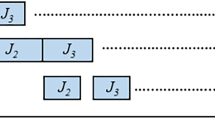Abstract
In traditional on-line problems, such as scheduling, requests arrive over time, demanding available resources. As each request arrives, some resources may have to be irrevocably committed to servicing that request. In many situations, however, it may be possible or even necessary to reallocate previously allocated resources in order to satisfy a new request. This reallocation has a cost. This paper shows how to service the requests while minimizing the reallocation cost. We focus on the classic problem of scheduling jobs on a multiprocessor system. Each unit-size job has a time window in which it can be executed. Jobs are dynamically added and removed from the system. We provide an algorithm that maintains a valid schedule, as long as a schedule with sufficient slack exists. The algorithm reschedules only a total number of \(O(\min \{\log ^*{n}, \log ^*{\varDelta }\})\) jobs for each job that is inserted or deleted from the system, where \(n\) is the number of active jobs and \(\varDelta \) is the size of the largest window.


Similar content being viewed by others
Notes
Before you get too skeptical about the motivation, this is exactly what M. F-C’s ophthalmologist does.
At first glance, Lemma 3 seems to contradict the underallocation requirement given in Lemma 8. That lower bound, however, applies to the general case, whereas this lemma applies to the aligned case.
References
Archetti, C., Bertazzi, L., Speranza, M.G.: Reoptimizing the traveling salesman problem. Networks 42(3), 154–159 (2003)
Archetti, C., Bertazzi, L., Speranza, M.G.: Reoptimizing the 0–1 knapsack problem. Discrete Appl. Math. 158(17), 1879–1887 (Oct. 2010)
Ausiello, G., Bonifaci, V., Escoffier, B.: Complexity and approximation in reoptimization. In: Cooper, S.B., Sorbi, A. (eds.) Computability in Context: Computation and Logic in the Real World, pp. 101–109. World Scientific, Singapore (2011)
Ausiello, G., Escoffier, B., Monnot, J., Paschos, V.T.: Reoptimization of minimum and maximum traveling salesman’s tours. J. Discrete Algorithms 7(4), 453–463 (2009)
Awerbuch, B., Azar, Y., Leonardi, S., Regev, O.: Minimizing the flow time without migration. SIAM J. Comput. 31(5), 1370–1382 (2002)
Bansal, N., Chan, H.-L., Khandekar, R., Pruhs, K., Stein, C., Schieber, B.: Non-preemptive min-sum scheduling with resource augmentation. In: Proceedings of the 48th Annual IEEE Symposium on Foundations of Computer Science (FOCS), pp. 614–624 (2007)
Becchetti, L., Leonardi, S., Muthukrishnan, S.: Average stretch without migration. J. Comput. Syst. Sci. 68(1), 80–95 (2004)
Bender, M.A., Farach-Colton, M., Fekete, S.P., Fineman, J.T., Gilbert, S.: Reallocation problems in scheduling. In: Proceedings of the 25th ACM Symposium on Parallelism in Algorithms and Architectures (SPAA), pp. 271–279 (2013)
Bender, M. A., Farach-Colton, M., Fekete, S. P., Fineman, J. T., Gilbert S.: Cost-oblivious storage reallocation. In: Proceedings of the 33rd ACM SIGMOD-SIGACT-SIGART Symposium on Principles of Database Systems (PODS) (2014)
Bender, M.A., Fineman, J.T., Gilbert S.: A new approach to incremental topological ordering. In: Proceedings of the 20th ACM-SIAM Symposium on Discrete Algorithms (SODA), pp. 1108–1115, January (2009)
Bender, M.A., Hu, H.: An adaptive packed-memory array. Trans. Database Syst. 4, 32 (2007)
Bendersky, A., Petrank, E.: Space overhead bounds for dynamic memory management with partial compaction. ACM Trans. Program. Lang. Syst. 34(3), 13 (2012)
Błażewicz, J., Nawrocki, J.: Dynamic storage allocation with limited compaction—complexity and some practical implications. Discrete Appl. Math. 10(3), 241–253 (1985)
Böckenhauer, H.-J., Forlizzi, L., Hromkovic, J., Kneis, J., Kupke, J., Proietti, G., Widmayer P.: Reusing optimal TSP solutions for locally modified input instances. In: Proceedings of the 4th IFIP International Conference on Theoretical Computer Science (TCS), pp. 251–270 (2006)
Caprara, A., Galli, L., Kroon, L., Maróti, G., Toth P.: Robust train routing and online re-scheduling. In: Proceedings of the 10th Workshop on Algorithmic Approaches for Transportation Modelling, Optimization, and Systems (ATMOS), vol. 14, pp. 24–33 (2010)
Chiraphadhanakul V., Barnhart C.: Robust flight schedules through slack re-allocation. Submitted (2011)
Cohen N., Petrank E.: Limitations of partial compaction: towards practical bounds. In: Proceedings of the ACM SIGPLAN Conference on Programming Language Design and Implementation (PLDI), pp. 309–320 (2013)
Davis, S., Edmonds, J., Impagliazzo R.: Online algorithms to minimize resource reallocations and network communication. In APPROX-RANDOM, pp. 104–115 (2006)
Fekete, S.P., Kamphans, T., Schweer, N., Tessars, C., van der Veen, J.C., Angermeier, J., Koch, D., Teich, J.: Dynamic defragmentation of reconfigurable devices. ACM Trans. Reconfigurable Technol. Syst. 5(2), 8:1–8:20 (June 2012)
Haeupler, B., Kavitha, T., Mathew, R., Sen, S., Tarjan R.E.: Faster algorithms for incremental topological ordering. In: Proceedings of the 35th International Colloquium on Automata, Languages, and Programming (ICALP), pp. 421–433, July (2008)
Hall N.G., Potts C.N.: Rescheduling for new orders. Oper. Res. 52(3), 440–453 (2004)
Itai, A., Konheim, A.G., Rodeh M.: A sparse table implementation of priority queues. In: Proceedings of the 8th Internationl Colloquium on Automata, Languages, and Programming (ICALP), vol. 115 of Lecture Notes in Computer Science, pp. 417–431 (1981)
Jackson J.: Scheduling a production line to minimize maximum tardiness. Technical Report, Management Science Research Project Research Report 43, University of California, Los Angeles (1955)
Jansen K., Klein K.-M.: A robust afptas for online bin packing with polynomial migration, In: Proceedings of the 40th International Colloquium on Automata, Languages, and Programming (ICALP), pp. 589–600 (2013)
Jiang, H., Barnhart, C.: Dynamic airline scheduling. Transp. Sci. 43(3), 336–354 (2009)
Kalyanasundaram, B., Pruhs, K.: Speed is as powerful as clairvoyance. J. ACM 47, 214–221 (1995)
Katriel I., Bodlaender H.L.: Online topological ordering. In: Proceedings of the 16th ACM-SIAM Symposium on Discrete Algorithms (SODA), pp. 443–450, January (2005)
Knuth, D.E.: The Art of Computer Programming: Fundamental Algorithms, vol. 1, 3rd edn. Addison-Wesley, New York (1997)
Kouvelis, p, Yu, G.: Robust Discrete Optimization and Its Applications. Kluwer, Amsterdam (1997)
Lan, S., Clarke, J.-P., Barnhart, C.: Planning for robust airline operations: Optimizing aircraft routings and flight departure times to minimize passenger disruptions. Transp. Sci. 40(1), 15–28 (2006)
Luby, M.G., Naor, J., Orda, A.: Tight bounds for dynamic storage allocation. SIAM J. Discret. Math. 9, 155–166 (1996)
Mulvey, J.M., Vanderbei, R.J., Zenios S.A.: Robust optimization of large-scale systems. Oper. Res. 43(2), 264–281 (1995)
Phillips, C.A., Stein, C., Torng, E., Wein, J.: Optimal time-critical scheduling via resource augmentation. Algorithmica 32(2), 163–200 (2002)
Robson, J.M.: An estimate of the store size necessary for dynamic storage allocation. J. ACM 18(3), 416–423 (July 1971)
Sanders, P., Sivadasan, N., Skutella, M.: Online scheduling with bounded migration. Math. Oper. Res. 34(2), 481–498 (2009)
Shachnai, H., Tamir, G., Tamir T.: A theory and algorithms for combinatorial reoptimization. In: Proceedings of the 10th Latin American Theoretical INformatics Symposium (LATIN), pp. 618–630 (2012)
Ting D.W.: Allocation and compaction—a mathematical model for memory management. In: Proceedings of the ACM SIGMETRICS Conference on Computer Performance Modeling Measurement and Evaluation (SIGMETRICS), pp. 311–317 (1976)
Tovey, C.A.: Rescheduling to minimize makespan on a changing number of identical processors. Naval Res. Logist. 33, 717–724 (1986)
Unal, A.T., Uzsoy, R., Kiran A.S.: Rescheduling on a single machine with part-type dependent setup times and deadlines. Ann. Oper. Res. 70, 93–113 (1997)
Verschae J.C.: The Power of Recourse in Online Optimization Robust Solutions for Scheduling, Matroid and MST Problems The Power of Recourse in Online Optimization: Robust Solutions for Scheduling, Matroid and MST Problems. PhD thesis, Technischen Universität Berlin, June (2012)
Westbrook, J.: Load balancing for response time. J. Algorithms 35(1), 1–16 (2000)
Willard D.: Maintaining dense sequential files in a dynamic environment (extended abstract). In: Proceedings of the 14th Annual Symposium on Theory of Computing (STOC), pp. 114–121 (1982)
Willard D.E.: Good worst-case algorithms for inserting and deleting records in dense sequential files. In: Proceedings of the International Conference on Management of Data (SIGMOD), pp. 251–260 (1986)
Willard, D.E.: A density control algorithm for doing insertions and deletions in a sequentially ordered file in good worst-case time. Inf. Comput. 97(2), 150–204 (1992)
Woodall, D.: The bay restaurant-a linear storage problem. Am. Math. Monthly 81(3), 240–246 (1974)
Author information
Authors and Affiliations
Corresponding author
Additional information
This research was supported in part by NSF grants IIS 1247726, IIS 1251137, IIS 1247750, CCF 1114930, CCF 1217708, CCF 1114809, CCF 0937822, CCF 1218188, by DFG grant FE407/17-1, and by Singapore NUS FRC R-252-000-443-133. A preliminary version appears in SPAA 2013 [8].
Rights and permissions
About this article
Cite this article
Bender, M.A., Farach-Colton, M., Fekete, S.P. et al. Reallocation Problems in Scheduling. Algorithmica 73, 389–409 (2015). https://doi.org/10.1007/s00453-014-9930-4
Received:
Accepted:
Published:
Issue Date:
DOI: https://doi.org/10.1007/s00453-014-9930-4




